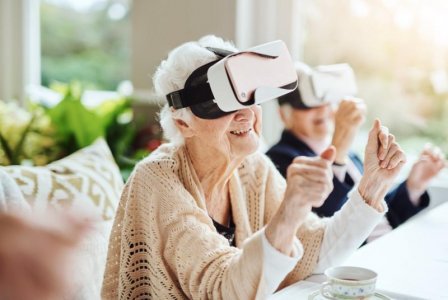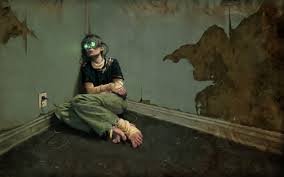Lara
Friend of the Arts
- Location
- Mid-Atlantic Coast
Virtual Reality Can Counteract Feelings Of Loneliness
Studies have found that isolation and loneliness are worse for health than obesity or smoking, especially if you are over 50—the risks of prolonged isolation are equivalent to smoking 15 cigarettes a day.
Virtual Reality (VR) is being used to better the lives of senior citizens all over the world by reducing loneliness, improving their mental health and transporting them to far-flung places without needing to leave the comfort of their home.
These are some recent examples of the ways immersive technology is having a positive impact on seniors.
Kenta Toshima, a Tokyo researcher, is using VR to help nursing home residents visit places from their pasts and tick off locations on their bucket lists. He's doing it by capturing made-to-order VR experiences with an 8K 360 camera.
“By supplementing their physical handicap with technology, the VR travel experiences can help improve the elderly’s motivation for rehabilitation and improve their quality of life. The VR experience makes them feel like they are out of the nursing home and can help ease their anxiety and loneliness.”
While virtual reality experiences are usually done alone, running a programme in a nursing home allows multiple patients to use the technology at once. Sharing their feelings and experience with those around them creates a sense of community which can counteract feelings of loneliness.
Videos of the elderly patients experiencing new places in virtual reality are shared on Toshima’s social media accounts—the results are truly heartwarming.
VR Allows Seniors to See Their Future Home Before It Exists
Moving is a major life event at any age, and it’s even more significant for retirees. To help seniors feel comfortable in their housing decisions, Cloverwood Senior Living is partnering with Arnold Imaging to use virtual reality to fully immerse prospective residents in a tour of the future Terraces at Cloverwood, allowing them to envision themselves in their potential new home.
According to the U.S. Census Bureau, people over age 65 represent 16% of the total U.S. population. By 2030, all Baby Boomers will be over the age of 65. Cloverwood’s introduction of immersive VR to the next generation of retirement living is giving seniors peace of mind, eliminating fear of change, and lending a memorable and impactful experience they can’t typically be offered before construction of a physical building.
Neuroscientists have learned that the way our brain makes big decisions—like where to live—draws from emotions we’ve stored and previous experiences (both positive and negative), then cross-references that with places we’ve been. If it’s a positive experience, we move forward; if it’s negative, we retreat.
Two Tucson retirement communities are the launch pad for a program to see how virtual reality technology helps senior citizens with cognition, dementia, loneliness and other issues.
Via Oculus Quest—Facebook’s standalone VR device—elderly residents have been able to ride on a roller coaster, visit the Egyptian Pyramids and take a trip down memory lane, back to places they used to live.
The program—Engage VR—was developed by Grayson Barnes, a 20-year-old Rochester Institute of Technology student for Watermark Retirement Communities.

VR Can Help Tackle Social Isolation
AARP Innovation Labs built Alcove, a VR app which focuses on family and social connection. Alcove bridges the physical distance between family members and empowers people to experience new places and things they wouldn’t otherwise be able to do because of cost, time or mobility constraints.
The immersive ecosystem that AARP has built at human scale allows users to enter and navigate on their own, or in multiplayer with their family and friends. For example, you can traverse a home with an elderly parent living alone. At first glance, the home seems ordinary, but users soon realize it is not.
AARP
Alcove seeks to bridge the physical distance between family members and empowers people to experience new places and things that they wouldn’t otherwise be able to do.
Alcove was developed in collaboration with Rendever—a startup which has a virtual reality platform that provides cognitive stimulation and socialization to seniors.
Studies have found that isolation and loneliness are worse for health than obesity or smoking, especially if you are over 50—the risks of prolonged isolation are equivalent to smoking 15 cigarettes a day.
Virtual Reality (VR) is being used to better the lives of senior citizens all over the world by reducing loneliness, improving their mental health and transporting them to far-flung places without needing to leave the comfort of their home.
These are some recent examples of the ways immersive technology is having a positive impact on seniors.
Kenta Toshima, a Tokyo researcher, is using VR to help nursing home residents visit places from their pasts and tick off locations on their bucket lists. He's doing it by capturing made-to-order VR experiences with an 8K 360 camera.
“By supplementing their physical handicap with technology, the VR travel experiences can help improve the elderly’s motivation for rehabilitation and improve their quality of life. The VR experience makes them feel like they are out of the nursing home and can help ease their anxiety and loneliness.”
While virtual reality experiences are usually done alone, running a programme in a nursing home allows multiple patients to use the technology at once. Sharing their feelings and experience with those around them creates a sense of community which can counteract feelings of loneliness.
Videos of the elderly patients experiencing new places in virtual reality are shared on Toshima’s social media accounts—the results are truly heartwarming.
VR Allows Seniors to See Their Future Home Before It Exists
Moving is a major life event at any age, and it’s even more significant for retirees. To help seniors feel comfortable in their housing decisions, Cloverwood Senior Living is partnering with Arnold Imaging to use virtual reality to fully immerse prospective residents in a tour of the future Terraces at Cloverwood, allowing them to envision themselves in their potential new home.
According to the U.S. Census Bureau, people over age 65 represent 16% of the total U.S. population. By 2030, all Baby Boomers will be over the age of 65. Cloverwood’s introduction of immersive VR to the next generation of retirement living is giving seniors peace of mind, eliminating fear of change, and lending a memorable and impactful experience they can’t typically be offered before construction of a physical building.
Neuroscientists have learned that the way our brain makes big decisions—like where to live—draws from emotions we’ve stored and previous experiences (both positive and negative), then cross-references that with places we’ve been. If it’s a positive experience, we move forward; if it’s negative, we retreat.
VR Can Be Used For Travel And Time Travel“We are removing the barrier of the unknown as people are able to see themselves in their new community and their new apartment. The tour has been met with great enthusiasm and excitement, defying stereotypes about older adults not being willing to embrace new technology. Our experience has been quite the opposite. The use of VR is mitigating anxiety because seniors are able to get an authentic and emotional feel for the atmosphere that typical renderings and 2D technology can’t offer.”
Adell Cuminale, Cloverwood Senior Marketing Counselor
Two Tucson retirement communities are the launch pad for a program to see how virtual reality technology helps senior citizens with cognition, dementia, loneliness and other issues.
Via Oculus Quest—Facebook’s standalone VR device—elderly residents have been able to ride on a roller coaster, visit the Egyptian Pyramids and take a trip down memory lane, back to places they used to live.
The program—Engage VR—was developed by Grayson Barnes, a 20-year-old Rochester Institute of Technology student for Watermark Retirement Communities.

VR Can Help Tackle Social Isolation
AARP Innovation Labs built Alcove, a VR app which focuses on family and social connection. Alcove bridges the physical distance between family members and empowers people to experience new places and things they wouldn’t otherwise be able to do because of cost, time or mobility constraints.
The immersive ecosystem that AARP has built at human scale allows users to enter and navigate on their own, or in multiplayer with their family and friends. For example, you can traverse a home with an elderly parent living alone. At first glance, the home seems ordinary, but users soon realize it is not.
Alcove Travel Room“There are no bedrooms, bathrooms, or kitchen. Instead, it is home to a magical space that invites discovery and allows users to transport themselves to new worlds, and explore the complete immersion and interactivity that VR has to offer.”
Cezara Windrem, Innovation Catalyst and Head of VR, AARP
AARP
Alcove seeks to bridge the physical distance between family members and empowers people to experience new places and things that they wouldn’t otherwise be able to do.
Alcove was developed in collaboration with Rendever—a startup which has a virtual reality platform that provides cognitive stimulation and socialization to seniors.
Last edited:





